Does colorectal cancer occur in old people?

Youngest age to get colon cancer
Can you get colon cancer in your 20s?
Can you get colon cancer at age 30?
Can you get colon cancer at 25?
Can you get colon cancer at 19?
Does colorectal cancer occur in old people?
The risk of colorectal cancer increases as people get older. Colorectal cancer can occur in young adults and teenagers, but the majority of colorectal cancers occur in people older than 50. For colon cancer, the average age at the time of diagnosis for men is 68 and for women is 72. For rectal cancer, it is age 63 for both men and women. Older patients who are diagnosed with colorectal cancer face unique challenges, specifically with regard to cancer treatment.
It is important to note while colorectal cancer is still diagnosed most commonly in older adults.
Read more about : What is colorectal cancer?
Read more about : Signs a fissure is healing
Read more about : Foods that cure fissures
Read more about : Anal abscess treatment
Youngest age to get colon cancer
In 2020, there will be about 18,000 cases of colorectal cancer diagnosed in people under 50, the equivalent of 49 new cases per day.
One in five colorectal cancer patients are between 20 and 54 years old.
It is the 3rd leading cause of cancer death in young adults.
The risk of colorectal cancer increases with age; 90% of cases are diagnosed in individuals 50 years of age and older.
While rates of colorectal cancer have been declining among adults 50 years and older, incidence of colorectal cancer is increasing among adults under age 50.
People born after 1990 have 2 times the risk of developing colon cancer and 4 times the risk of developing rectal cancer than those born in 1950.
In 2020, there will be an estimated 49 new cases of colorectal cancer in people under 50 diagnosed a day, or 18,000 for the year.
Younger adults were more likely than older adults to be diagnosed with late-stage colon or rectal cancers because they are under the recommended screening age.
Read more about: colorectal cancer prevention
Read more about: Colorectal Cancer treatment in Iran
Can you get colon cancer in your 20s?
Can you get colon cancer at age 30?
In 2020, there will be about 18,000 cases of colorectal cancer diagnosed in people under 50, the equivalent of 49 new cases per day. One in five colorectal cancer patients are between 20 and 54 years old. It is the 3rd leading cause of cancer death in young adults.
Can you get colon cancer at 25?
Most doctors will not jump to a diagnosis of colon cancer in a young adult of 25 years, regardless of your presenting symptoms. Many symptoms of colon cancer mimic other, less serious gastrointestinal problems that are much more likely.
Read more about: colorectal cancer treatments
Read more about: colorectal cancer staging
Can you get colon cancer at 19?
Colorectal cancer is among the most common malignancies in the US with 95,000 colon and 39,000 rectal cancer cases estimated to occur in 2017. In patients under the age of 20 however colon cancer is literally 1 in a million.
Read more about: Colorectal Cancer Pathophysiology
Read more about: colorectal cancer risk factors
10 common questions about colorectal cancer age
[kkstarratings]

